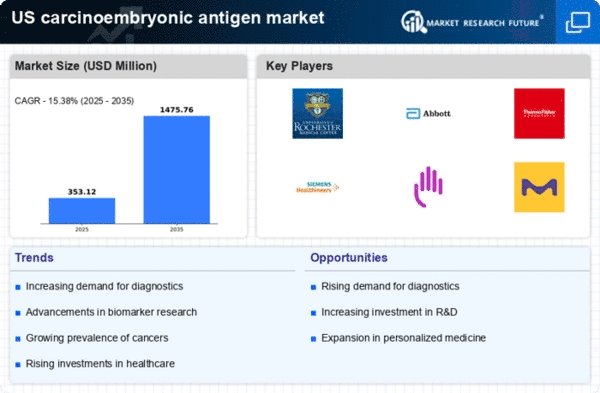Rising Healthcare Expenditure
Healthcare expenditure in the United States has been on an upward trajectory, which is positively impacting the carcinoembryonic antigen market. Increased spending on healthcare services and technologies allows for greater investment in diagnostic tools, including carcinoembryonic antigen tests. According to the Centers for Medicare & Medicaid Services, national health spending is projected to grow at an average rate of 5.4% annually, reaching nearly $6 trillion by 2027. This financial commitment to healthcare is likely to enhance the availability and accessibility of carcinoembryonic antigen testing, thereby driving market growth. Additionally, as more healthcare facilities adopt advanced diagnostic technologies, the carcinoembryonic antigen market is expected to benefit from improved patient outcomes and increased demand for routine screenings.
Increased Awareness and Education
There is a growing awareness and education surrounding cancer screening and the role of biomarkers in diagnosis, which is positively influencing the carcinoembryonic antigen market. Public health campaigns and educational initiatives by organizations such as the American Cancer Society are helping to inform patients and healthcare providers about the importance of early detection and the utility of carcinoembryonic antigen testing. This heightened awareness is likely to lead to increased testing rates, as patients become more proactive in seeking diagnostic services. As a result, the carcinoembryonic antigen market may see a significant uptick in demand, potentially increasing by 10% in the next few years as more individuals seek out these essential diagnostic tools.
Increasing Demand for Early Detection
The carcinoembryonic antigen market is experiencing a notable surge in demand for early cancer detection methods. As healthcare providers and patients increasingly recognize the importance of early diagnosis in improving treatment outcomes, the market is likely to expand. The American Cancer Society reports that early detection can lead to a 5-year survival rate of over 90% for certain cancers. This growing awareness is driving investments in diagnostic technologies, which in turn fuels the carcinoembryonic antigen market. Furthermore, advancements in testing methodologies are enhancing the accuracy and reliability of carcinoembryonic antigen tests, making them more appealing to healthcare professionals. As a result, the market is poised for growth, with projections indicating a potential increase in market value by approximately 15% over the next five years.
Growing Focus on Personalized Medicine
The carcinoembryonic antigen market is being influenced by the increasing emphasis on personalized medicine. As healthcare shifts towards tailored treatment approaches, the role of biomarkers like carcinoembryonic antigen becomes more critical. Personalized medicine aims to optimize treatment efficacy based on individual patient profiles, which often includes specific biomarker testing. The National Institutes of Health has highlighted the importance of biomarkers in guiding treatment decisions, suggesting that the carcinoembryonic antigen market could see a rise in demand as more clinicians adopt personalized strategies. This trend may lead to a more significant integration of carcinoembryonic antigen testing in clinical practice, potentially increasing its market share by an estimated 20% in the coming years.
Advancements in Research and Development
Ongoing research and development efforts in oncology are significantly impacting the carcinoembryonic antigen market. As scientists explore new applications and improve existing testing methodologies, the market is likely to benefit from innovative solutions. The National Cancer Institute has reported a steady increase in funding for cancer research, which supports the development of advanced diagnostic tools, including carcinoembryonic antigen tests. These advancements may lead to enhanced sensitivity and specificity in detecting cancer, thereby increasing the adoption of these tests in clinical settings. Consequently, the carcinoembryonic antigen market could experience a growth rate of approximately 12% over the next few years as new technologies emerge and gain traction among healthcare providers.
















